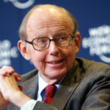On China
(Libby/OverDrive eBook, Kindle)
Available Platforms
Description
More Details
Excerpt
Similar Titles From NoveList
Similar Authors From NoveList
Published Reviews
Publisher's Weekly Review
In this canny, engaging historical study, the ex-secretary of state examines China's foreign policy for insights into its statecraft and soul. Kissinger (Crisis) recaps China's geo-strategic wei qi match-his ubiquitous metaphor for the subtle positioning characteristic of the national board game-from the Korean War to today's trade disputes, emphasizing the relationship with the U.S. as it moved from bitter enmity to cordial interdependence. He grounds his narrative in a penetrating analysis of age-old features of Chinese policy, emphasizing the Middle Kingdom's hauteur, wariness of encirclement-to the Chinese, he argues, America is just another barbarian horde to manipulate-and dread of domestic disorder. As an architect of Nixon's opening to China and a freelance go-between for later administrations, Kissinger is a major figure in the story, and the text often revolves around exegeses of his cryptic dialogues with Chinese leaders. The book therefore oozes Kissingerian realism, with its stress on great power machinations, international balance, and high-stakes summitry and its impatience with human rights strictures; a deadpan wit and cold-blooded candor flash out from clouds of diplomatic euphemism. Though it sometimes feels like a mind game between mandarins of many stripes, and Kissinger's generalizations about Chinese national character can also sound outmoded, this insider's account sheds a revealing light on the contours of Chinese-American relations. (May) (c) Copyright PWxyz, LLC. All rights reserved.
Library Journal Review
Kissinger, at the age of 88, presents a beguiling, penetrating, and indispensable survey of China's classical and modern relations with the world. It is not perfect. Specialists will fault the premodern chapters for accepting the myth of China's Middle Kingdom complex and disagree with particular points in later chapters. Still, the story of relations since the 1950s is at once full of insights into the leaders and their psychologies, epic in its sweep, and challenging in its underlying argument on the nature of diplomacy. Critics charge that Kissinger's realpolitik subordinated morality to great power hegemony and stability, but the narrative aims to show that America's foundational principles of freedom and human rights are not advanced by unilateral declarations and ritualistic denunciation. Because Chinese leaders have long since ceased to spread their ideology and perceive Americans as hypocritical in seeking to impose theirs, to hector China is to ignore genuine popular hypersensitivity to imperialism, undermine projects of mutual benefit, and discredit leaders who seek a "peaceful rise" as being in China's national interest. Verdict Essential for everyone with an interest in China. [See Prepub Alert, 11/29/10.]-Charles W. Hayford, Northwestern Univ., Evanston, IL (c) Copyright 2011. Library Journals LLC, a wholly owned subsidiary of Media Source, Inc. No redistribution permitted.
Kirkus Book Review
From the eminent elder statesman, an astute appraisal on Chinese diplomacy from ancient times to thefraught present "strategic trust" with the United States.Former Secretary of State Kissinger (Crisis : The Anatomy of Two Major Foreign Policy Crises: Based on the Record of Henry Kissinger's Hitherto Secret Telephone Conversations, 2003, etc.) brings his considerable scholarly knowledge and professional expertise to this chronicle of the complicated evolution and precarious future of Chinese diplomacy with the West. Traditionally, Chinese foreign policy as practiced by centuries of emperors was marked by appeasement and generally overwhelming their barbarian enemies with Chinese largesse: the "five baits" included clothing, music, slaves and food to "corrupt" the opponent into seeing things the Chinese way. In their supreme self-containment, the Chinese disdained the importunate advances of the barbarians until the aggressive incursions by the West to force open the barriers to trade in the late 18th century. Foreign threats by the West, Russia and Japan and the series of "unequal treaties" imposed on China impelled it into a period of "self-strengthening" that was finally achieved by the Communist consolidation of power under Mao. From Mao's declaration in 1949 that the Chinese people "have stood up," the Chinese practiced a modern form of pursuing the "psychological advantage," rather than the military (shades of Sun Tzu), in confronting the superpowers. However, a new era commenced under Deng Xiaoping, who was bent on reform and open to travel and new ideas, and normalization of relations with America was finally established under President Carter. Kissinger wisely considers Tiananmen, Taiwan, the elevation of Jiang Zemin and the new era of "cooperative coexistence" maintained by President Hu Jintao. The author warns, however, that despite China's commitment to a "peaceful rise," the U.S.-China relationship will continue to contain an underlying tension.Sage words and critical perspective lent by a significant participant in historical events.]] Copyright Kirkus Reviews, used with permission.
Library Journal Reviews
Ever the scholar, Kissinger can't just talk about Sino-American relations over the past six decades and his considerable part in the diplomatic dance involved; he goes back to China's early history as a power so vast it had no equal yet preferred subtlety to military action. Expect lots of attention. Copyright 2010 Reed Business Information.
LJ Express Reviews
Kissinger, at the age of 88, presents a beguiling, penetrating, and indispensable survey of China's classical and modern relations with the world. It is not perfect. Specialists will fault the premodern chapters for accepting the myth of China's Middle Kingdom complex and disagree with particular points in later chapters. Still, the story of relations since the 1950s is at once full of insights into the leaders and their psychologies, epic in its sweep, and challenging in its underlying argument on the nature of diplomacy. Critics charge that Kissinger's realpolitik subordinated morality to great power hegemony and stability, but the narrative aims to show that America's foundational principles of freedom and human rights are not advanced by unilateral declarations and ritualistic denunciation. Because Chinese leaders have long since ceased to spread their ideology and perceive Americans as hypocritical in seeking to impose theirs, to hector China is to ignore genuine popular hypersensitivity to imperialism, undermine projects of mutual benefit, and discredit leaders who seek a "peaceful rise" as being in China's national interest. Verdict Essential for everyone with an interest in China. [See Prepub Alert, 11/29/10.]-Charles W. Hayford, Northwestern Univ., Evanston, IL (c) Copyright 2011. Library Journals LLC, a wholly owned subsidiary of Media Source, Inc. No redistribution permitted.
Publishers Weekly Reviews
In this canny, engaging historical study, the ex-secretary of state examines China's foreign policy for insights into its statecraft and soul. Kissinger (Crisis) recaps China's geo-strategic wei qi match—his ubiquitous metaphor for the subtle positioning characteristic of the national board game—from the Korean War to today's trade disputes, emphasizing the relationship with the U.S. as it moved from bitter enmity to cordial interdependence. He grounds his narrative in a penetrating analysis of age-old features of Chinese policy, emphasizing the Middle Kingdom's hauteur, wariness of encirclement—to the Chinese, he argues, America is just another barbarian horde to manipulate—and dread of domestic disorder. As an architect of Nixon's opening to China and a freelance go-between for later administrations, Kissinger is a major figure in the story, and the text often revolves around exegeses of his cryptic dialogues with Chinese leaders. The book therefore oozes Kissingerian realism, with its stress on great power machinations, international balance, and high-stakes summitry and its impatience with human rights strictures; a deadpan wit and cold-blooded candor flash out from clouds of diplomatic euphemism. Though it sometimes feels like a mind game between mandarins of many stripes, and Kissinger's generalizations about Chinese national character can also sound outmoded, this insider's account sheds a revealing light on the contours of Chinese-American relations. (May)
[Page ]. Copyright 2010 PWxyz LLCReviews from GoodReads
Citations
Kissinger, H. (2011). On China . Penguin Publishing Group.
Chicago / Turabian - Author Date Citation, 17th Edition (style guide)Kissinger, Henry. 2011. On China. Penguin Publishing Group.
Chicago / Turabian - Humanities (Notes and Bibliography) Citation, 17th Edition (style guide)Kissinger, Henry. On China Penguin Publishing Group, 2011.
Harvard Citation (style guide)Kissinger, H. (2011). On china. Penguin Publishing Group.
MLA Citation, 9th Edition (style guide)Kissinger, Henry. On China Penguin Publishing Group, 2011.
Copy Details
| Collection | Owned | Available | Number of Holds |
|---|---|---|---|
| Libby | 2 | 2 | 0 |


































